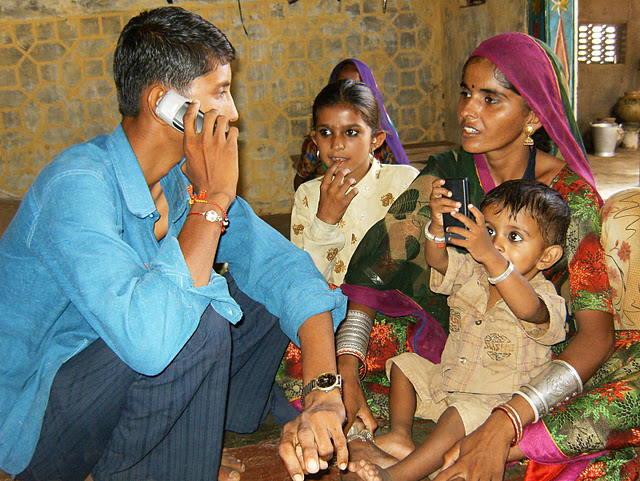mDirectory
The mDirectory is the most comprehensive database of information on mobile tech for social change on the Web.
We welcome your contributions of case studies, mobile tools, research, and how-to guides.
Map Search
You need to upgrade your Flash Player
Click on country to view country search page
Contribute to the mDirectory
Add case studies, mobile tools, research, and how-to guides to the mDirectory! Click on "contribute to the mDirectory" to add to the world's largest database for mobile phone activists.
Featured Case Study
Philly's Chinatown has struggled in recent years to maintain its geographic integrity with development encroaching its boundaries. There are internal challenges as well with frequent brak-ins and trash littering the streets. There is an imperative to coordinate residents, businesses and organizations to unite to address problems and prevent further encroachment. Yet, coordination and cooperation have been difficult to attain. For these reasons we wanted to design a communication system accessible via mobile phone specifically for Philadelphia’s Chinatown, to help its citizens and organizations address themselves, each other, and the greater Philadelphia community.
The range of dialects and cultural backgrounds in Chinatown make face-to-face communication rare for many residents. We wanted to create a social media system for our project that could potentially help forge social ties and build the essential element of trust in a new way. The system we envisioned would have features that address what we have identified as needs in the neighborhood:
Read More
05.25.11 | GGuth714 |
Democratic Participation
Featured Mobile Tool
Awaaz.De (“Give your voice”) is a software platform enabling organizations to engage with poor, remote, and marginal communities by providing on-demand, many-to-many information access through mobile phones. People access Awaaz.De applications by dialing regular phone numbers to create, browse, and share voice content through automated voice interfaces. Voice makes it easy to provide services in local languages, overcomes literacy constraints, and offers a low barrier to content creation: one only needs to know how to speak into a phone. Organizations use Awaaz.De to host voice-based information portals, discussion forums, Q&A services, classifieds, and more. For example, rural development organizations can offer demand-driven agricultural extension through a farmer Q&A service, broadcast market prices and weather reports targeted by crop and location, or perform real-time data collection on availability of farm inputs and outputs. In this way, Awaaz.De helps organizations reach previously disconnected people with on-demand, locally relevant information, in their language. Most importantly, Awaaz.De is a social platform that supports people to give their own voice and participate not just as passive consumers, but active producers of knowledge.
create, browse, and share voice content through automated voice interfaces. Voice makes it easy to provide services in local languages, overcomes literacy constraints, and offers a low barrier to content creation: one only needs to know how to speak into a phone. Organizations use Awaaz.De to host voice-based information portals, discussion forums, Q&A services, classifieds, and more. For example, rural development organizations can offer demand-driven agricultural extension through a farmer Q&A service, broadcast market prices and weather reports targeted by crop and location, or perform real-time data collection on availability of farm inputs and outputs. In this way, Awaaz.De helps organizations reach previously disconnected people with on-demand, locally relevant information, in their language. Most importantly, Awaaz.De is a social platform that supports people to give their own voice and participate not just as passive consumers, but active producers of knowledge.
Currently Awaaz.De serves eight social development organizations and enterprises across six states in India working in agriculture, education, women’s empowerment, labor rights, and rural products. These organizations serve as content providers, and use Awaaz.De to disseminate their informational content in real time, as well as collect input from the community through interactive features. These organizations have proven the value of Awaaz.De through willingness to pay; partners pay a recurring monthly fee to host their customized voice information service with Awaaz.De
The other demonstration of Awaaz.De’s value comes through the response from the communities of users. To date, Awaaz.De has served over 100,000 calls from over 10,000 unique callers. People rate content highly whenever ratings are solicited; in one deployment, the average rating was 2.8/3 from 325 individual ratings. A bit more anecdotally, unsolicited messages of praise and gratitude come in regularly from people. In a study where an Awaaz.De partner sent agricultural information broadcasts to farmers and then prompted for a question or comment, 37% of the recordings posted were simply comments of praise for the service, compared to 41% posts asking technical agricultural questions. To us, these are small indicators of Awaaz.De's potential for not only building knowledge capital, but social capital. Here’s another good anecdotal example.
Read More
11.04.11 | neilp |
Livelihood & Economic Development
Featured How-to
Twitter is a way to get your messages to a wider audience. However, you should know that from any platform (computer or mobile phone), it is not a secure method of communicating sensitive information. Consider the following guidelines:
- Your Tweets should only contain information you want to widely and publicly share. This should be public information that can be freely distributed by you, your organization, and your supporters, without any risk to individuals or organizational operations.
- Even if you protect your tweets so that only followers can see them, followers can easily retweet your messages, or access them over an insecure connection.
Read More
06.17.11 | SaferMobile |
Citizen Media

